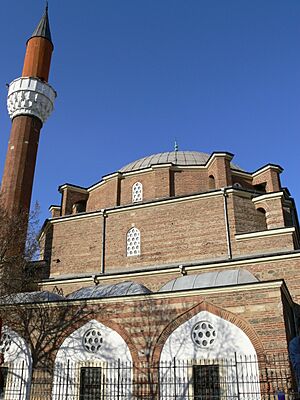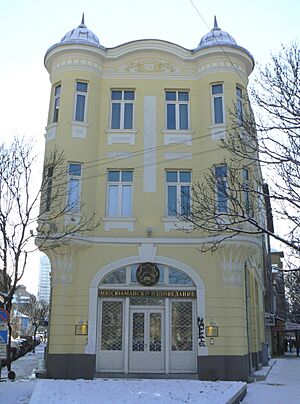Islam in Bulgaria facts for kids
Islam is the second largest religion in Bulgaria, right after Christianity. Many people believe that about 13% of Bulgaria's population follows Islam. Most of the Muslims in Bulgaria are of Turkish background. There are also many Bulgarians who are Muslims.
Bulgaria is one of the countries in the European Union with a significant percentage of Muslims.
Contents
Islam in Bulgaria
Islam has been a part of Bulgaria's history for a very long time. It became a major religion during the time of the Ottoman Empire, which ruled Bulgaria for nearly 500 years. During this period, many mosques were built, and Islamic traditions became part of the culture in some areas.
Who Are Bulgarian Muslims?
The majority of Muslims in Bulgaria are ethnic Turks. They are descendants of people who settled in Bulgaria during the Ottoman rule or are native to the region. Besides Turks, there are also other groups who practice Islam. These include the Pomaks, who are Bulgarian-speaking Muslims, and some Roma communities. Each group has its own unique cultural traditions while sharing the Islamic faith.
Places of Worship
Across Bulgaria, you can find many mosques, which are places where Muslims pray. Some of these mosques are very old and have beautiful architecture, like the Banya Bashi Mosque in the capital city of Sofia. These buildings are important for the community and for preserving the history of Islam in the country.
Religious Leadership
The main organization that represents Muslims in Bulgaria is the General Mufti's Office. A "Mufti" is a religious leader who gives advice on Islamic law and leads the Muslim community. This office helps organize religious life, education, and charitable activities for Muslims throughout Bulgaria.
Islam Today
Today, Islam continues to be an important part of Bulgaria's diverse society. Muslims live peacefully alongside people of other faiths, contributing to the country's culture and economy. The government protects religious freedom, allowing all communities to practice their beliefs openly.
Images for kids
 | Percy Lavon Julian |
 | Katherine Johnson |
 | George Washington Carver |
 | Annie Easley |





